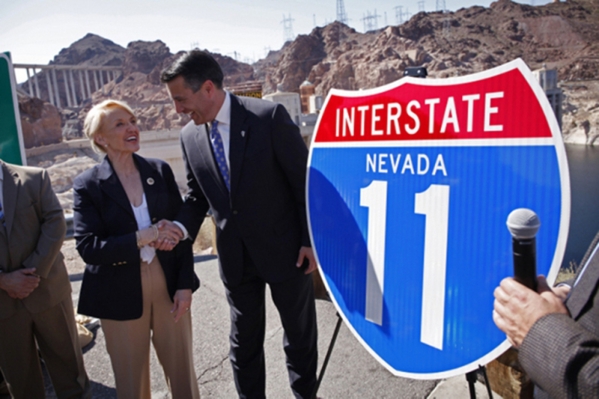
WASHINGTON — A proposed interstate highway directly connecting Las Vegas and Reno won a major boost Tuesday when key lawmakers formally announced a compromise on a huge five-year transportation bill authorizing funding for the nation’s highway, bridge, transit and rail programs.
Language on the Interstate 11 extension has been a top transportation goal for members of the Nevada delegation.
While the Fixing America’s Surface Transportation Act is an authorization bill and does not provide specific funding for the proposed project, the language in the measure advances the current priority designation of I-11 from Phoenix to Las Vegas north and beyond from Las Vegas to Interstate 80 along the U.S. 95 corridor, 200 miles of which runs through Nye County.
Meg Ragonese, public information officer for the Nevada Department of Transportation, said the new road will meet interstate standards “at a minimum.” She said that means the road will be at least four lanes wide and include a divider, which could be made up of space or a railing.
The American Association of State Highway and Transportation Officials has higher design standards for interstate highways than U.S. and state highways, including:
*Controlled access with interchanges and grade separations, including railroad crossings.
*A minimum of two lanes in each direction.
*A minimum lane width of 12 feet.
*A minimum outside paved shoulder of 10 feet and minimum inside paved shoulder of 4 feet.
*Maximum grades of 6 percent, with some exceptions of 7 percent in mountainous areas.
*Vertical clearance of 16 feet in rural areas and 14 feet in urban areas on overpasses.
Sen. Dean Heller, R-Nev., described the I-11 provisions in the act a “major win” for the state.
“Connecting Phoenix, Las Vegas, and Northern Nevada will spur long-term economic development, create jobs, and bolster international trade,” Heller said.
Rep. Cresent Hardy, R-Nev., a member of the House Transportation and Infrastructure Committee who served on the conference committee that produced the compromise bill, said the agreement “underlines the need for long-term transportation planning and improvement projects.”
“I was a contractor for decades in my professional life,” he said.
Hardy’s office also provided comments from Tina Quigley, general manager for the Regional Transportation Commission of Southern Nevada.
“This is huge for us,” Quigley said.
“We are growing increasingly aware that we need to diversify our economy in Southern Nevada. I-11 is the future for us to be able to do that in terms of more effectively moving both goods and people,”
Rep. Dina Titus, D-Nev., chairwoman of the I-11 Caucus, also singled out the measure for authorizing a new Nationally Significant Freight and Highway Projects program that she said could help fund I-11.
“Our federal transportation programs are vital to the economic development of the Las Vegas Valley,” said Titus, a member of the House Transportation and Infrastructure Committee.
She said other provisions she sponsored to enhance travel and tourism and promote safety for pedestrians and other non-motorized users were included in the compromise version.
Heller also singled out language ensuring that Nevada and California communities in the Lake Tahoe area will be considered as a singular entity by the U.S. Department of Transportation, which could boost funding options for future projects.
A long-awaited bill following multiple temporary extensions that kept the federal transportation programs funded, the compromise version is designed to provide long-term certainty for state agencies.
Its offsets are expected to raise more than $70 billion to help the Highway Trust Fund, which receives its money from fuel taxes, remain solvent through the end of fiscal year 2020.
Those offsets range from the sale of crude oil from the Strategic Petroleum Reserve and indexing user fees collected by the U.S. Customs service to changes to dividend payments the Federal Reserve makes to member banks.
Legislative leaders are hoping to schedule floor debate and votes in the coming days on the bill, which historically has been popular with rank-and-file lawmakers.
Not everyone was ready to support the compromise version.
Camden Fine, president and CEO of the Independent Community Bankers of America, expressed opposition to using the banking sector to paying for the bill.
Sen. Tom Carper, D-Del., a senior member of the Senate Environment and Public Works Committee, said the bill is paid for by a “grab bag of budget gimmicks.”
Review-Journal writer Richard N. Velotta contributed to this report. Contact Jim Myers at jmyers@reviewjournal.com. Find him on Twitter: @myers_dc